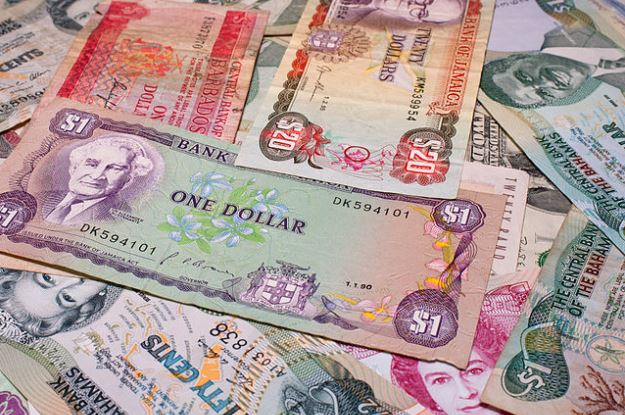(This article has been updated)
In countries like Haiti, remittances matter. Many Haitians rely on money sent from family abroad to meet daily needs, especially in the wake of natural disasters such as Hurricane Matthew, which tore through the country in October.
But in Haiti and throughout the Caribbean, sending and receiving remittances is getting more difficult – and more costly. Part of the reason is a trend in global banking called de-risking in which international banks, eager to cut potential liabilities, have limited or ended correspondent relationships with local banks. The practice has hit the Caribbean particularly hard.
“There are maybe 3 million or 5 million Haitians now wanting to send money to their families (after Hurricane Matthew) and if they are not able to do so then it creates a catastrophic issue,” said Joanna Charles, President of the Caribbean Association of Banks. All seven of Haiti’s local banks have experienced disruptions in correspondent banking services as a result of the trend, according to a recent report from the Caribbean Community (CARICOM), a regional body.
In light of tightening regulations after the 2008 global economic crisis, as well as increased scrutiny of offshore banking in the wake of this summer’s Panama Papers scandal, correspondent relationships – in which international banks work with local banks to facilitate transactions in foreign currency – have become increasingly risky. Faced with rising compliance costs and the threat of heavy sanctions if local bank partners are found guilty of negligence or malfeasance, many international banks are choosing to terminate relationships entirely.
“It is almost impossible for them to find enough benefits in the relationship to keep that relationship open,” Paul Dwyer, CEO of Viamericas, a money transfer company, told AQ, citing the high possibility of sanctions and the relatively small slice of revenues that Caribbean banks provide in return.
While de-risking has increased across the globe, the Caribbean is among the regions that has been most affected. As a way station between North and South America, financial institutions in the Caribbean are perceived as being vulnerable to money laundering, offshore banking and illicit financing for drug-trafficking organizations.
As a result, ever fewer banks in the Caribbean are able to conduct transactions in foreign currency. In a 2015 World Bank study, 89 percent of the Caribbean jurisdictions surveyed reported significant to moderate declines in their foreign correspondent banking relationships. And the effects on people’s ability to send remittances could be severe. In Jamaica, for example, remittances accounted for more than 16 percent of GDP in 2015.
The inability to conduct transactions in foreign currencies could also prove detrimental for Caribbean trade and tourism, on which the region is heavily dependent.
“The tourists who come to visit our shores will pay in foreign currency for vacation,” Trevor Brathwaite, the deputy governor of the Eastern Caribbean Central Bank, told AQ. “If someone is coming from overseas and pays for their trip using a credit card, we need to be in a position where there is international exchange.” Braithwaite added that de-risking has hindered the exchange of foreign currencies for local currencies and vice versa.
All this has sent the region scrambling for solutions. CARICOM has been particularly vocal on the need to address the region’s increasing isolation from the international banking system. In a speech to the United Nations General Assembly in October, Prime Minister of St. Kitts & Nevis Timothy Harris said that “some 16 banks, across five countries, have lost all or some of their correspondent banking relationships” so far this year.
Caribbean banking officials, for their part, bemoan the fact that most Caribbean banks strictly comply with regulations; they say that foreign banks are pulling out of the region on the basis of perceived rather than actual risk, and should make greater efforts to manage liabilities, instead of avoiding them entirely.
Entrepreneurs in the region are also looking for solutions. Barbadian entrepreneur Gabriel Abed is the co-founder and CEO of Bitt, Inc., a digital wire transfer service based on Bitcoin technology. Abed said in an interview with BraveNewCoin, a digital trade publication, that his business has grown more than 30 percent each month since February as traditional wire services have become more costly.
“It’s transferring value from point A to point B … all I have done is given my consumers the ability to do that digitally, instantly, transparently … enabling remittances for the lowest cost in the Caribbean,” Abed told AQ.
Still, while services like Bitt may offer an increasingly viable solution, some of the factors underlying the de-risking movement don’t look soon to be resolved. Many foreign banks feel justified in ending their relationships with Caribbean banks, a sentiment that was reinforced when the U.S. Department of State in March released a list of countries that present a “primary jurisdiction of concern” for money laundering that included various Caribbean states.
“I can understand the need for the U.S. to protect the financial system … but it shouldn’t be a broad brush decision (to de-risk),” said Charles of the Caribbean Association of Banks. One set of regulatory standards, she said, would make life easier for everyone.
The headline on this story was updated to clarify the challenges facing Caribbean banks.
—
Williams is an editorial intern for AQ from Jamaica.







